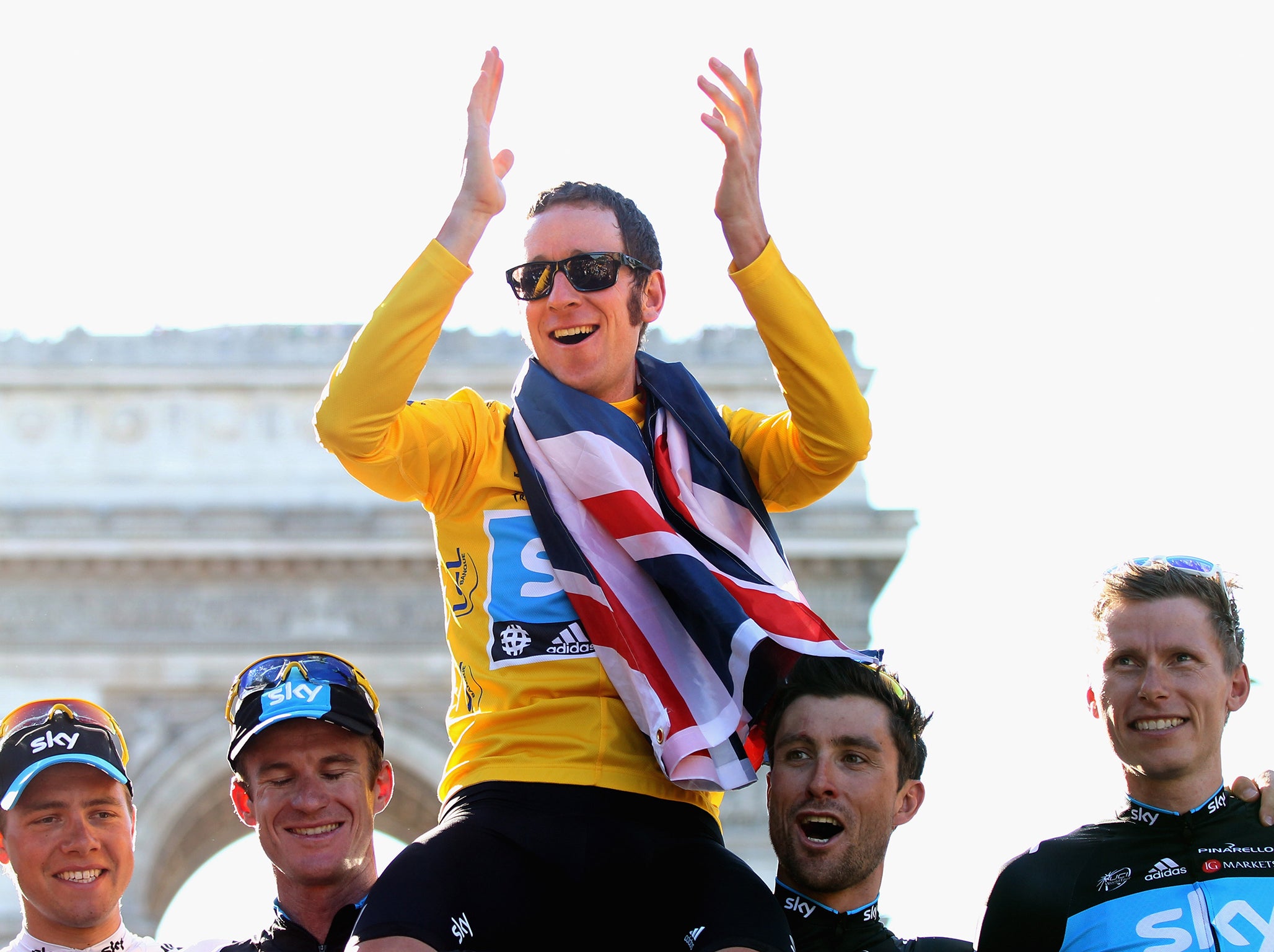In creeping around cycling’s rough edges, Team Sky have destroyed the last remnants of their credibility
The select committee’s damning report portrays a team determined to bend the rules – a far cry from the picture of integrity painted by Dave Brailsford upon its creation
If you were in charge of cycling’s doping rules, what would you change?
A good question, and one which was put to Dave Brailsford in March 2015. “If I was head of the UCI, looking after doping,” he told the Cycling Podcast, “I would start with zero tolerance towards the little things, really get on top of the… of the creep around the edges that seems to potentially be possible. Is there a misuse of TUEs?”
Monday’s parliamentary report on doping in sport concluded there was, and that Brailsford’s team and lead rider Bradley Wiggins “crossed an ethical line” in using medically permitted drugs as performance enhancers. It is true that cycling suffers in its grey areas, at the rough edges it has failed to smooth, but it now seems clear that they have been systematically exploited.
A powerful corticosteroid, triamcinolone, was used by Wiggins on up to nine occasions in a four-year period, the report revealed – a vastly excessive amount to treat a reasonable medical need. The select committee made clear it had little doubt Wiggins used triamcinolone to improve performance while preparing to win the 2012 Tour de France, using it not for medical treatment, as is permitted in competition, but to “improve his power to weight ratio”.
What is so damning is that the report indicates more than isolated incidents of rule-bending or individual opportunism. It paints a picture of a plan hatched by the team and executed not only by Wiggins but “a smaller group of riders [who] trained separately from the rest of the team”. According to the select committee’s source, this group of riders were all using corticosteroids out of competition “to lean down in preparation for major races”. It is not prohibited, but it is a flabbergasting flaunt of Team Sky’s own whiter-than-white anti-doping mantra upon which the team was supposedly founded.
Even coach Shane Sutton, Wiggins’ close ally who resigned from British Cycling in 2016 amid allegations of sexism and bullying, described Team Sky’s use of corticosteroids as “unethical”, arguably a more savage blow to Wiggins’ credibility – and certainly a more painful one – than the nameless source from the DCMS report. “That hurts me,” Wiggins said on Monday evening of Sutton’s verdict.

In the soft-focus documentary which followed Team Sky during their hugely successful 2012 season, we are sold a story of what can be achieved when good clean British ingenuity takes on the world’s most morally bankrupt sport. Brailsford’s colleagues swoon over the benefits of his ploy of ‘marginal gains’; colour-coded water bottles, standardised seat heights, a luxury coach for travelling: they all count.
In one clip, team chef Soren Kristiansen cheers his energy-conserving food programme while chopping some aubergines. In another, team physio Dan Guillemette lauds their “really good” pillows. “That’s the whole thing about marginal gains,” he says, after tucking in the sleep-enhancing sheets beneath a hypoallergenic mattress. “On their own they probably don’t make a great deal of difference, but add them together and that’s the difference between this team and our rivals.”
His point stands; it’s just that the pillows and the power food were part of a false reality, acting as a front to cover a far darker method of achieving those gains.
Team Sky and Wiggins have both strongly denied the report’s accusations, and you could reasonably hesitate when noting that much of the select committee’s most damning information is from a solitary source. But then you remember all the questions which went unanswered in the Jiffy Bag saga, the contradictions, the lack of record keeping; Dr Richard Freeman’s stolen laptop, the chaotic medical storeroom in Manchester, the admission by Sutton that Team Sky exploited TUEs to “find the gains”. And so the denials ring hollow.
The revelations suggest why Brailsford might not have wanted Team Sky to join the Movement for Credible Cycling (MPCC), a group set up by leading professional teams in order to encourage self-policed anti-doping measures. On one occasion Brailsford explained that the reason he held Team Sky back was that their zero-tolerance policy on employing former drug cheats conflicted with the MPCC’s slightly more lax attitude. But what now seems more telling is the fact that the MPCC loudly called to prohibit in-competition use of all corticosteroids.
Team Sky is now clinging on to its existence while Brailsford’s role seems untenable – as the parliamentary committee wrote: “Brailsford must take responsibility for these failures, the regime under which Team Sky riders trained and competed, and the damaging scepticism about the legitimacy of his team’s accomplishments.”
In another edition of the Cycling Podcast, back in 2014, Brailsford was asked whether he resented the constant questions coming Team Sky’s way. No, he said, Team Sky was set up with a strong anti-doping stance, with a zero-tolerance policy, and they should be held to account by those high standards. “If we waver from that, even a little, people come at us,” he said. “And rightly so.”
They wavered more than many people thought, or perhaps wanted to believe. They might have wavered in more ways than we yet know. They sold a false reality of marginal gains, via a good night’s sleep and healthy living, but the reality is that all along, Team Sky were the ones creeping around the edges.
Join our commenting forum
Join thought-provoking conversations, follow other Independent readers and see their replies
Comments
Bookmark popover
Removed from bookmarks